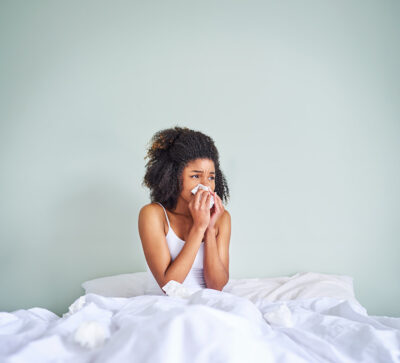How To Sleep Better During Allergy Season
- by Tracey L. Kelley
- Updated: April 5, 2024

If sniffling, sneezing, and itchiness weren’t bad enough during the day, it can be incredibly frustrating to deal with all of that and more when you’re trying to get a peaceful night’s rest. Even if you manage seasonal and environmental allergies as best as possible, additional factors — such as high pollen counts, open windows, and dust mites — can make sleeping with allergies more challenging.
When your allergies are in overdrive and prevent you from sleeping well, your ability to function well the next day declines. Here’s what you need to know to reduce your allergen impact, avoid the sniffles, and get some quality rest.
How Do Allergies Affect Sleep?
Our body has a way of covertly removing allergens from our system. Its secret weapon? Mucus! In fact, the National Institutes of Health (NIH) refers to it as “The Slime That Keeps You Healthy.”
Mucus acts as a moisture barrier to help capture and later remove foreign particles to ward off infection. We always have a little goo in various parts of our body, including the eyes, mouth, stomach, lungs, and sinuses, and don’t usually notice the continuous work it does. But when you have an allergic response, “your immune system overreacts to a harmless substance, like pollen, dust, or animal dander,” according to the NIH. Once this happens, your body releases histamine, which causes many allergy symptoms such as itchy or watery eyes, nasal congestion, and sneezing as a way for the body to rid itself of various irritants.
However, too much of a good thing can cause problems. “The congestion and mucosal swelling induced by allergies can affect the ability to breathe comfortably through the nose,” Dr. Jill A. Poole, a professor and division chief of allergy and immunology at the University of Nebraska Medical Center, tells Sleepopolis. Known as allergic rhinitis, this condition impacts your ability to fall and stay asleep throughout the night.
Poole notes that people who have allergic rhinitis frequently experience the following sleep disorders or challenges:
- Insomnia, including both transient and chronic insomnia
- Trouble falling asleep, which can throw off your circadian rhythm
- Difficulty staying asleep, resulting in disrupted sleep cycles
- Increased snoring, which causes more disrupted sleep and physical ailments such as sore throat and dry mouth
- Increased risk for sleep apnea, a serious condition that causes breath to stop and start through the night
- Difficulty tolerating CPAP devices, which provide consistent airflow through the nose to prevent interrupted breathing. Some people trying to sleep with allergies have nasal passages too inflamed to use these machines.
She adds that allergic rhinitis has also been associated with:
- Restless sleep
- Sleep-disordered breathing
- Daytime dysfunction
- Difficulty waking up
- Daytime sleepiness
- Morning headaches
- The use of sleep medications
Additionally, “poor sleep quality can also increase anxiety and stress, and in turn, affect the ability to fall asleep subsequently,” Poole says. A lack of sleep can also weaken your immune system, which, according to some studies, can make allergic rhinitis worse.
Types of Allergies That Keep You Awake
According to the Asthma and Allergy Foundation of America (AAFA), here are the most common types of allergies that cause the symptoms above and affect your sleep:
- Non-stinging insects, which includes cockroaches and the “insect-like” dust mite. These little buggers are often responsible for year-round environmental allergies.
- Fungal growth, which includes mold and mildew found indoors and outdoors.
- Pets, thanks to certain proteins found in their dander (dead skin cells), saliva, and urine. Despite popular belief, there’s no such thing as a hypoallergenic dog or cat, and people react differently to certain animals compared to others.
- Airborne pollen, also known as hay fever or “seasonal allergic rhinitis”, stems from various plants, including grasses, trees, and weeds.
Why Are Allergies Worse At Night And In The Morning?
Poole says individuals bring allergens to bed with them, especially during the height of allergy season. “For example, if pollen counts were high during the day when [the person with allergies] was outside, and then they go to bed without showering, the daytime pollen exposures exist at night.”
Additionally, no matter how lovely cool spring and fall breezes might be, pollen is floating into your bedroom through open windows. Most of the time, pollen counts are highest at midday, generally rising in early morning and tapering off later in the evening. However, there are many variables that alter this trajectory, including what type of landscaping you have, shifting winds and weather patterns, and humidity.
Additionally, If you don’t have a protective cover on your mattress and pillows, “dust mite allergens are commonly found in bedding products and can elicit nasal irritation and swelling,” Poole says. Both dust mites or exposure to pollen throughout the day can lead to irritated sinuses come bedtime.
And as much as it pains animal lovers, sleeping with pets worsens allergies, too, even if you’re only mildly affected.
When to Consult a Doctor
If you’ve struggled with sniffling and sneezing during sleep and when you wake up, it’s probably time for professional medical treatment to understand what might be the source of your respiratory woes.
“Skin testing is a relatively easy way to discover what you’re specifically allergic to, and that information leads to a tailored approach, including avoidance of the allergens,” Poole recommends. “There are numerous treatments available — from antihistamines to prescription medications to various classes of nasal sprays — and many individuals require a multi-mediation/therapeutic approach.”
She says other options include allergy immunotherapy, also known as allergy shots or tablets, to desensitize some individuals to specific allergens.
Tips to Help You Sleep Better With Allergies
Want more relief methods for sleeping with allergies? We can help! Here are some of the best ways to ease your symptoms.
Adjust The Timing Of Your Medication Regimen
“If allergy symptoms are worse at night and interfere with sleep, consider taking antihistamine and nasal sprays in the evening,” Poole says. Consult your healthcare provider first about prescription and over-the-counter medications that cause sleepiness.
Flush Away The Allergens
A sinus rinse is an easy way to remove bacteria. Poole suggests doing this a couple of hours before bedtime to avoid post-nasal drip during the night, or rinsing first thing in the morning to remove nasal secretions from the upper airways.
Rinsing involves using an inexpensive device such as a neti pot or squeeze bottle filled with a saline solution and distilled, filtered, or boiled water. To learn how to do it, follow these instructions from the Cleveland Clinic. You can also buy pre-filled saline rinse applications at most drug stores.
Know The Daily Allergy Count For Your Location
If airborne irritants are the culprit, consult the National Allergy Map to know what’s happening in your area and when. For example, AAFA states that in certain areas of the U.S., pollination is most prevalent for:
- Trees between February and May (although some species start as early as January)
- Grasses between April and June
- Weeds between August and November
Manage The Mites
AAFA indicates there are more than 13 species of dust mites. These microscopic pests devour the flakes of dead skin we leave behind. The average human adult sloughs approximately 1.5 grams of skin daily, “enough to feed one million dust mites.” Ew!
Dust mites thrive in relatively humid climates with greater than 50 percent humidity and temperatures above 68 degrees. Poole recommends using dust-mite bedding barriers to reduce exposure. Also wash bedding once a week in hot water (typically 130 degrees Fahrenheit) to kill dust mites and remove the allergens.
“Additionally, to keep home humidity less than 50 percent, consider a dehumidifier or air conditioner,” she says. “Dust mites also live in carpet and curtain treatments, so choose hardwood or tile floors and remove fabric curtains in locations with high humidity.”
Increase The Moisture
However, not all moisture is bad for allergy control. In fact, it’s important to drink plenty of water during allergy season, as dehydration contributes to increased histamine levels, making it more likely you’ll have an allergic reaction.
Additionally, when the air is too dry, you’re at risk for drying out your nasal passage and giving allergens easier access to your lungs, so try to regulate moisture in your home and bedroom with a humidifier in dryer climates or seasons.
Keep The Pollen At Bay
Get into the habit of closing windows, using an air conditioner, and running an air purifier, especially in the bedroom. Additional tips include:
- If you’ve been outside during the day, shower and wash your hair before bedtime or, at the very least, make sure your clothes end up in the laundry.
- Don’t hang your clothes outside to dry on high pollen days — you’ll find yourself sniffling in no time.
- And after walking pets, use a damp cloth to wipe them down at the door to remove pollen spores.
Make The Bedroom A “Pet Free” Zone
“Keep pets out of the bedroom, particularly if individuals are allergic to them,” Poole advises. “Do this even during the day so the bedroom is a ‘pet-free zone’. Pet-associated allergens and dander stick around for a very long time. Pets can also potentially disturb sleep due to their movements.”
Try A New Sleep Position
Poole adds that one of the best sleep positions for allergies is to elevate your head. This prevents mucus from pooling in the back of your throat as it does when you’re lying flat. Prop up on a thicker pillow at a gradual incline that supports your neck and back.
Invest In Hypoallergenic Bedding
Shelby Harris, Sleepopolis’ director of sleep health, says having the right bedding can make all the difference. “Get hypoallergenic products for your bed in your room,” she says. “So pillows, sheets, all that stuff is really going to help.”
Vacuum Routinely
Any dust can cause allergies to flare up, so Harris recommends vacuuming every day (or as often as you can manage).
The Last Word From Sleepopolis
There’s no need to lose sleep over allergies. With the proper medical treatment and simple lifestyle changes, you can minimize the impact caused by vexing seasonal and environmental irritants and get the healthy rest you need to keep them at bay.
